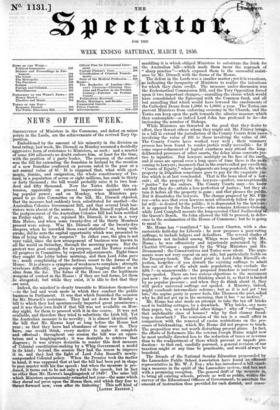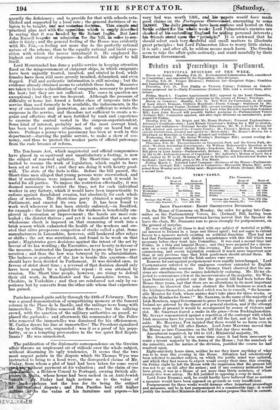NEWS OF THE WEEK.
Onsintrermn. of Ministers in the Commons and defeat on minor points in the Lords, are the athieveinents of revived Tory Op- Vosition.
- Emboldened by the amount of his minority in the division on
• local rating, last week, Mr. Disraeli on Monday assumed a decidedly aggressive formpf resistance to Ministers, as such : and a muster of some 250 adherents no doubt endows him, at least for the time, with the position of -a- party leader. The occasion of the contest was the bill for extending the franchise in beland by the creation of a new franchise conferred on persons rated to the poor at a net annual value of 8/. It is -fluppiised that, what with eject- ments, /amine and emigration, the whole. constituency of Ire- -land, in a population of seven or eight millions, has sunk to thirty or forty Thousand ; the bill would probably raise it to two hnn- clred and fifty thousand. Now the Tories dislike this ex- tension, apparently on general impressions against extend- ing popular power; and on Monday, when Ministers pro-
posed go into Committee on the bill, Mr. Disraeli objected, at the Measure had suddenly been substituted for another—the Australian Colonies Government Bill, and that several Irish bar- risters were absent at the assizes. Lord John Russell replied, that the postponement of the Australian Colonies Bill had been notified on Friday night. If so, rejoined Mr. Disraeli, it was in a very thin Rouse, and when some twenty-five • of the thirty Members present were asleep. Was Mr. Disraeli one of the twenty-five sleepers, when he recorded these exact statistics ? or, being wide awake, did he note the capital opportunity which was presented to him of being taken by surprise ? In either case, the plea is not very valid, since the new arrangement of business was known to all the world on Saturday, through the morning papers. But the
• pretext was good enough for its purpose, and the Tories resisted all progress M Committee, by repeated. adjournments. Eight times they sought the lobby before morning, and then Lord John gave in ; much complaining of the factious resort to the forms of the :House. It is always a symptom of weakness to complain : strength overbears difficulty, or grasps reparation, begging neither as an -alms from the foe. The forms of the House are the legitimate weapons of contest in the House : if they are bad forms, let them be abrogated; but while they exist, it is idle to fret that they . are used. -
Indeed, the mischief is dearly traceable to Ministers themselves --to the bad and weak mode in which they condlict the'public business in Parliament. It was that which furnished the occasion for Mr. Disraeli's resistance. They had set down for Monday a bill to which they had spontaneously imparted great prominence ; • and it was their own fault if that bill was not available on Mon- day night, for them to proceed with it in due course. It was not available, and therefore they tried to substitute the Irish bill. Yet ,
the Australian measure is no novelty ; it is almost identical with the bill that Mr. Hawes kept so long before the House last year ;. so that they have had abundance of time over it. They have, one would think, every motive to make it complete and effectual : throughout one session the bill was an oppro- brium and a laughingstock; it was desirable to retrieve that disgraee • it was always desirable to render this first measure of Colonial constitution-making by a Whig Government a model in its kind; beyond the session they had the recess to improve • ' it in, and they -had the light of Lord john Russell's newly- compounded Colonial policy. When the Premier took the matter in hand, it was supposed that at last the bill had been put in shape to pass muster with his fine speech : but when the measure is pro- . awed, it turns out to be not only a foil to the speech, but in fact no other than Mr. Hawes's laughingstock of 1849! The same bill • which Ministers spontaneously retracted last year—the same which they dared not press upon the House then, and which they fear to
• thrust forward now, even after its tinkering! This soft kind of [LATEST EDITION.] muddling it is which obliged Ministers to substitute the Irish for the Australian bill—which made them incur the reproach of "sharp practice "—which exposed them to the successful resist- ance by Mr. Disraeli with the forms of the House. The defeat in the Lords was a smaller matter; yet it is vexatious, indicating the incapacity of Ministers to realize the intentions for which they claim credit. The measure under discussion was the Ecclesiastical Commission Bill, and the Tory Opposition forced upon it two important changes,—annulling the clause which would have consolidated the Episcopal with the Common fund, and all but annulling that which would have lowered the emoluments of the Cathedral Deans from 1,5001. to 1,000/. a year. The Tories, can prevent Ministers from enforcing economy in the Church, and the Tories can keep open the path towards the ulterior measure which they contemplate—as indeed Lord John has professed to do—for increasing the number of Bishops.
While Ministers are thwarted in the good that they desire to effect, they thwart others whom they might aid. Mr. Fitzroy brings., in a bill to extend the jurisdiction of the County Courts from cases- involving the value of 20/. to those involving the value of 501. The County Courts have worked very well ; their summary process has been found to render justice really -acceisible : for if • some super-refinement of logical exactness may attend the long- deliberated processes of other courts,' the delay alone converts jus- tice to injustice.' But lawyers' multiply on the face of the earth, and if cases are spread over a long space of time there is the nide coming to lawyers ; insomuch that in the courts called par excellence "Courts of Equity," where judgments are long pondered, the Whole property in litigation Sometimes goes to pay for the exquisite jus- tice which is at last vouchsafed. That is the beau ideal of a law- suit ; all the property for the lawyers—perfect, unexceptionable " justice " for the suitors. The County Courts may—we know not that they do—attain a less perfection of justice ; but they at- Min it before all the property is gone ; and that pleases the public. But it dissatisfies the lawyers. The change proposed by Mr. Fitz- roy—who sees that even lawyers must ultimately follow the popu- lar will—is desired by the public ; it is deprecated by the lawyers : it is opposed by Sir John Jervis—who remains .Attorney-General,
• while Lord Campbell mounts the long-coveted Chief Juiticeshig of the Queen's Bench. Sir John allowed the bill to proceed, in defer- ence to the acclamation of the House of Commons ; but he is going to maul it.
Mr. Hume has " ventilated " his Lesser Charter, with a dm- raeteristic field-day for Liberals : he now proposes a poor-rating suffiuge, to include lodgers and defaulters. The several shades of Reformers not included among Whigs were heartily with Mr. Hume; he was offensively and injuriouslypatroni'mzed by Mr. Chartist O'Connor ; opposed by the -Whig Ministers 'titers and Mr. Drummond : the Conservatives and Tories were silent. The argu- ments were not very cogent on any side, but particularly feeble on the Treasury-bench. The chief point- in Lord John Russell's ob- jection, hovrilter—if you disturb the -existing suffrage to admit four out of five of the adult male population, why exclude the fifth ?—is unanswerable : the proposed franchise is universal suf- frage spoiled. There are two serious objections to the movement just now: the people are not thinking about it, so that it is baeked by no popular pressure • and when they do think- abed it, they will prefer universal suffrage not spoiled. - A Ministry, indeed, might vouchsafe intermediate reforms ; but as it is not yet ". too late," the supine,Tarty in power feels, like Thomson the poet, asked why he did not get up in the morning, that it has "no motive."
Mr. Hume has also made an attempt to take the tax off bricks used in building cottages, by a drawback. Why bricks, any more
than paper, tea, or a hundred other things P; why off "cottages,"
that undefinable class of houses? why by that clumsy fraud- trap a drawback ? The remission of the tax is a small affair in
comparison with the removal of excise restrictions on the pro- cesses of tziakm airing, _which Mr. Hume did not propose to touch. The proposition was not worth distu,Thing present plans. In fact,
the efforts of Reformers like the veteran Joseph Hume might now
be most usefully directed less to the -reductien of taxes or revenue than to the readjustment of those which prevent or impede 'pro-
duction: to that end, candidly pursued, a general revision of our taxation might at any time be practicable, and would always be beneficial.
The friends of the National Secular Education propounded by the Lancashire Public School Association have found an eilicieut
representative in Mr. W. I Fox ; who has introduced a bill enact-
ing a measure in the spirit of the Lancashire system, and has met with a promising. reception. • The general drift of the measure is, to bring all existing schools, private as well as public, Within the survey of the Educational Officers of Government; to ascertain the amount of instruction thus provided for each district, and cense- cLuently the deficiency ; and to provide for that with schools esta- blished and supported by a local rate ; the general doctrines of re- ligion to be taught, bat wet seats:Kim doctrioa. This .siinple and .practical plan met with the opposition which is amply described m saying that it was beaded -11, Err Robot Nits. But Idled John -Russell bespoke me admissaua Tor the 'bill, ma onier to con- sider it fairly ; and the general feeling of the House was evidently with Mr. Fox,—a feeling not more clue to the perfectly rational nature of the scheme, than to the equally rational and lucid expo- sition with which the mover introduced it. He employed the highest and strongest eloquence—he allowed his subject to tell itself.
Lord Mounteashel has done a public service in keeping attention fixed on the misgovernment of emigrant ships, in -which emigrants have been unjustly treated, insulted, and stinted in food, while females have been still more grossly insulted, debauched, and even flogged. Full and authentic information is still missing ; but the evidence already obtained seems to establish these foot.. measures are taken to insure a classification of emigrants, necessary to protect the best; but they are not sufficient. The eases in question are exceptional ; but they are too frequent. Although the pressure of difficulty at home has forced a better class of surgeons into the service than used formerly to be available, the inducements, in the way of emolument and promotion, are not sufficient to retain the surgeons in the service, and therefore not sufficient to create a re- gular and effective staff of men fortified by rank and experience to exercise the control vested in the surgeon-superintendent. Some kind of interest, probably not of the most corrupt kind, has been used to procure situations, not only on board but on shore. Perhaps a penny-wise parsimony has been at work in this department—starving the public service, to make a show of eco- nomy, and thus to protect the weaker parts of official patronage from the rude breezes of reform.

























